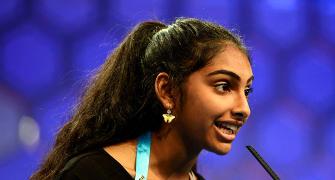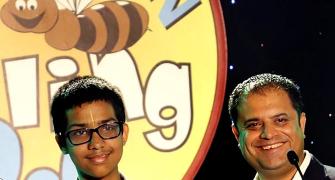'The fact that India is multilingual and the kids grow up already bilingual or trilingual so learning another language or learning other spelling patterns is not really that hard.'

On Thursday, May 30, 2024, Bruhat Soma, a 12-year-old seventh grader from Tampa, Florida, became the latest Indian American child to win the Scripps National Spelling Bee, the world's most prestigious spelling competition.
Bruhat won the contest against another 12 year old, Faizan Zaki, from Plano, Texas, in a spell-off, spelling 29 words in 90 seconds. Faizan spelt 20 words in 90 seconds. This was only the second time in Spelling Bee history that a spell-off determined the winner.
Earlier this year, according to Associated Press, Bruha had won the Words of Wisdom bee hosted by Scott Remer, 'a former speller and study guide author. He won the SpellPundit bee organized by that study guide company. And he won the first-ever online bee emceed by Dev Shah, last year's Scripps champion.'
Remer, who trained Faizan for this year's contest, trained the winner of the Scripps National Spelling Bee competition in 2010 when he was only 16.
A speller and a contestant himself in 2007 and 2008, he graduated from Yale and has made a successful career as an experienced Spelling Bee coach.
He spoke about training Dev Shah, the 2023 Spelling Bee Champion, and explained the reason why Indian origin kids do exceptionally well in the competition.
"The one other thing, families coming from India, maybe English isn't always their first language but they are familiar with English, they have fluency in English, and so there's less of a barrier," Scott Remer tells Rediff.com US Contributor Abhijit J Masih.
The concluding part of a two-part interview:

How do Indian origin kids do so well in spelling bees? What in your understanding is the secret sauce that makes Indian kids such hot dishes at the Spelling Bee?
There are multiple reasons actually. The first one probably has to do with offseason practice.
Some of those Spelling Bees, like the South Asian Spelling Bee and the North South Foundation, I'm pretty sure is only open to desis.
That impacts things too because that's some extra practice that members of other groups might not have.
The second reason I think is more cultural -- valuing hard work, education and language.
The fact that India is multilingual and the kids grow up already bilingual or trilingual so learning another language or learning other spelling patterns is not really that hard. They already have the habit.
A third factor is US immigration policy. Who actually can emigrate from India to the US? Generally, it's doctors, engineers, lawyers, highly skilled professionals.
They not only have the education but also have the habits to inculcate in their children and oftentimes the discretionary income to spend on tutors, resources and materials.
The last thing is just tradition. Once enough people have done it becomes part of the culture. It is pretty solidly established.
The one other thing, families coming from India, maybe English isn't always their first language but they are familiar with English, they have fluency in English, and so there's less of a barrier.

For the Champions, do you think this is their one moment of glory? What happens next?
In the immediate term, it'll be very busy. A lot of spellers who are winners go on to stay involved in the spelling world in various ways.
Either they help to run Spelling Bees or they may continue to cultivate some sort of a relationship with Scripps.
Oftentimes, kids end up going on to do stuff that's related to linguistics.
For a lot of kids, because it's something that's been such a huge part of life for multiple years, there's a little bit of an empty desk afterwards.
Some of the kids don't do anything with it. They say I've had my chapter. It was a good one, and now I'm ready to focus on other things.
It kind of depends on the kid. But a lot of kids, who love the Spelling Bee, tend to stay involved.

Do you think there is scope for taking Spelling Bee International especially to English speaking countries like India?
It would be an interesting way of creating and fostering cultural diplomacy. It's a nice competition, probably one of the sweetest and most heartwarming competitions you can watch.
I think that people from other countries, even if they don't necessarily have the habit of having Spelling Bees, might find it to be a very interesting.
Canada normally participates, Ghana has participated for a long time Jamaica does and certain parts of Europe and there are spelling bees in other parts of Africa.
India certainly could. The challenge might be more logistical. I also see no reason why you couldn't have Indian competitors at the National Spelling Bee. They might just have to call it the International Spelling Bee.

What advice do you have for parents who would like their kids to prepare for Spelling Bee and how early can one start?
There's always a question of how early is too early to start training. I do think there is there is a balance though, because if they start too early, and they don't have a good positive first experience, it oftentimes can turn the kid off from the activity.
So I think it's important not to force children to do something.
The most important thing is to read constantly to the kid, try to build their vocabulary on a daily basis to just make good associations between language and books.
I would say around six or seven you can start slowly introducing the concept of a Spelling Bee. So that the first experiences be filled with positive reinforcement and encouragement.
The period where the kids really start to have their own interest in it, and the period when it really is possible to start training them and tutoring them tends to be around nine or ten.
Feature Presentation: Ashish Narsale/Rediff.com









